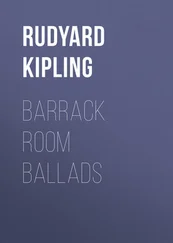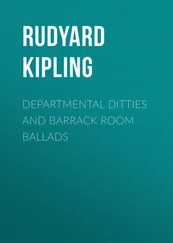MRS. G. Why will you always treat me like a child? I know I'm not displacing the horrid things.
CAPT. G. ( Resignedly. ) Very well, then. Don't blame me if anything happens. Play with the table and let me go on with the saddlery. ( Slipping hand into trousers–pocket. ) Oh, the deuce!
MRS. G. ( Her back to G.) What's that for?
CAPT. G. Nothing. ( Aside. ) There's not much in it, but I wish I'd torn it up.
MRS. G. ( Turning over contents of table. ) I know you'll hate me for this; but I do want to see what your work is like. ( A pause. ) Pip, what are 'farcy–buds'?
CAPT. G. Hah! Would you really like to know? They aren't pretty things.
MRS. G. This Journal of Veterinary Science says they are of 'absorbing interest.' Tell me.
CAPT. G. ( Aside. ) It may turn her attention.
Gives a long and designedly loathsome account of glanders and farcy
MRS. G. Oh, that's enough. Don't go on!
CAPT. G. But you wanted to know—Then these things suppurate and matterate and spread—
MRS. G. Pip, you're making me sick! You're a horrid, disgusting schoolboy.
CAPT. G. ( On his knees among the bridles. ) You asked to be told. It's not my fault if you worry me into talking about horrors.
MRS. G. Why didn't you say—No?
CAPT. G. Good Heavens, child! Have you come in here simply to bully me?
MRS. G. I bully you? How could I! You're so strong. ( Hysterically. ) Strong enough to pick me up and put me outside the door and leave me there to cry. Aren't you?
CAPT. G. It seems to me that you're an irrational little baby. Are you quite well?
MRS. G. Do I look ill? ( Returning to table. ) Who is your lady friend with the big gray envelope and the fat monogram outside?
CAPT. G. ( Aside. ) Then it wasn't locked up, confound it. ( Aloud. ) 'God made her, therefore let her pass for a woman.' You remember what farcy–buds are like?
MRS. G. ( Showing envelope. ) This has nothing to do with them. I'm going to open it. May I?
CAPT. G. Certainly, if you want to. I'd sooner you didn't, though. I don't ask to look at your letters to the Deercourt girl.
MRS. G. You'd better not, Sir! ( Takes letter from envelope. ) Now, may I look? If you say no, I shall cry.
CAPT. G. You've never cried in my knowledge of you, and I don't believe you could.
MRS. G. I feel very like it to–day, Pip. Don't be hard on me. ( Reads letter. ) It begins in the middle, without any 'Dear Captain Gadsby,' or anything. How funny!
CAPT. G. ( Aside. ) No, it's not Dear Captain Gadsby, or anything, now. How funny!
MRS. G. What a strange letter! ( Reads. ) 'And so the moth has come too near the candle at last, and has been singed into—shall I say Respectability? I congratulate him, and hope he will be as happy as he deserves to be.' What does that mean? Is she congratulating you about our marriage?
CAPT. G. Yes, I suppose so.
MRS. G. ( Still reading letter. ) She seems to be a particular friend of yours.
CAPT. G. Yes. She was an excellent matron of sorts—a Mrs. Herriott—wife of a Colonel Herriott. I used to know some of her people at Home long ago—before I came out.
MRS. G. Some Colonels' wives are young—as young as me. I knew one who was younger.
CAPT. G. Then it couldn't have been Mrs. Herriott. She was old enough to have been your mother, dear.
MRS. G. I remember now. Mrs. Scargill was talking about her at the Duffins' tennis, before you came for me, on Tuesday. Captain Mafflin said she was a 'dear old woman.' Do you know, I think Mafflin is a very clumsy man with his feet.
CAPT. G. ( Aside. ) Good old Jack! ( Aloud. ) Why, dear?
MRS. G. He had put his cup down on the ground then, and he literally stepped into it. Some of the tea spirted over my dress—the gray one. I meant to tell you about it before.
CAPT. G. ( Aside. ) There are the makings of a strategist about Jack, though his methods are coarse. ( Aloud. ) You'd better get a new dress, then. ( Aside. ) Let us pray that that will turn her.
MRS. G. Oh, it isn't stained in the least. I only thought that I'd tell you. ( Returning to letter. ) What an extraordinary person! ( Reads. ) 'But need I remind you that you have taken upon yourself a charge of wardship'—what in the world is a charge of wardship?—'which, as you yourself know, may end in Consequences—'
CAPT. G. ( Aside. ) It's safest to let 'em see everything as they come across it; but 'seems to me that there are exceptions to the rule. ( Aloud. ) I told you that there was nothing to be gained from rearranging my table.
MRS. G. ( Absently. ) What does the woman mean? She goes on talking about Consequences—'almost inevitable Consequences' with a capital C—for half a page. ( Flushing scarlet. ) Oh, good gracious! How abominable!
CAPT. G. ( Promptly. ) Do you think so? Doesn't it show a sort of motherly interest in us? ( Aside. ) Thank Heaven, Harry always wrapped her meaning up safely! ( Aloud. ) Is it absolutely necessary to go on with the letter, darling?
MRS. G. It's impertinent—it's simply horrid. What right has this woman to write in this way to you? She oughtn't to.
CAPT. G. When you write to the Deercourt girl, I notice that you generally fill three or four sheets. Can't you let an old woman babble on paper once in a way? She means well.
MRS. G. I don't care. She shouldn't write, and if she did, you ought to have shown me her letter.
CAPT. G. Can't you understand why I kept it to myself, or must I explain at length—as I explained the farcy–buds?
MRS. G. ( Furiously. ) Pip, I hate you! This is as bad as those idiotic saddle–bags on the floor. Never mind whether it would please me or not, you ought to have given it to me to read.
CAPT. G. It comes to the same thing. You took it yourself.
MRS. G. Yes, but if I hadn't taken it, you wouldn't have said a word. I think this Harriet Herriott—it's like a name in a book—is an interfering old Thing.
CAPT. G. ( Aside. ) So long as you thoroughly understand that she is old, I don't much care what you think. ( Aloud. ) Very good, dear. Would you like to write and tell her so? She's seven thousand miles away.
MRS. G. I don't want to have anything to do with her, but you ought to have told me. ( Turning to last page of letter. ) And she patronises me , too. I 've never seen her! ( Reads. ) 'I do not know how the world stands with you; in all human probability I shall never know; but whatever I may have said before, I pray for her sake more than for yours that all may be well. I have learnt what misery means, and I dare not wish that any one dear to you should share my knowledge.'
CAPT. G. Good God! Can't you leave that letter alone, or, at least, can't you refrain from reading it aloud? I've been through it once. Put it back on the desk. Do you hear me?
MRS. G. ( Irresolutely. ) I sh—shan't! ( Looks at G'.s eyes. ) Oh, Pip, please! I didn't mean to make you angry—'Deed, I didn't. Pip, I'm so sorry. I know I've wasted your time―
CAPT. G. ( Grimly. ) You have. Now, will you be good enough to go—if there is nothing more in my room that you are anxious to pry into?
MRS. G. ( Putting out her hands. ) Oh, Pip, don't look at me like that! I've never seen you look like that before and it hu–urts me! I'm sorry. I oughtn't to have been here at all, and—and—and—( sobbing ). Oh, be good to me! Be good to me! There's only you—anywhere!
Читать дальше












